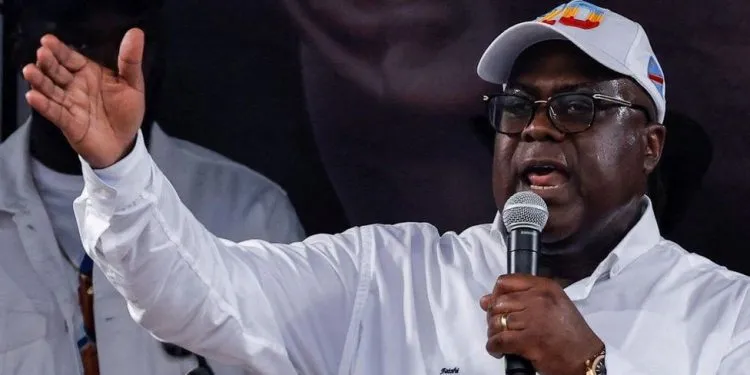KINSHASA, Democratic Republic of Congo – President Félix Tshisekedi has been declared the winner of DR Congo’s December 20 election, securing a second term in a poll marred by widespread logistical problems and condemned as a “sham” by several opposition candidates.
Key Points:
- Tshisekedi wins re-election with 73% of the vote, sparking opposition outcry.
- Allegations of widespread irregularities and manipulation taint the poll.
- Concerns about electoral integrity echo previous disputed elections.
- Tensions over eastern conflict and accusations against Rwanda add to volatility.
- Constitutional Court’s verdict on January 10 hinges on potential challenges.
Tshisekedi won a commanding 73% of the vote, with his nearest challenger, Moise Katumbi, trailing far behind at 18%. Yet, the celebratory mood on the streets, where his supporters danced and waved flags, was overshadowed by the shadow of allegations and potential unrest.
The election day itself was riddled with issues. Millions faced hours-long waits, polling stations opened late, and malfunctioning voting machines plagued 30% of locations, according to an observer group. These irregularities fueled accusations of deliberate manipulation by the incumbent, leading opposition candidates to call for protests.
“We call on our people to take to the streets en masse after the proclamation of electoral fraud,” they declared in a united statement, questioning the legitimacy of the announced results.
Adding fuel to the fire, the opposition’s claims received validation from Martin Fayulu, who secured third place with 5%. Fayulu, the previous election’s disputed winner, accused the current poll of being “rigged” and lacking “integrity.”
Meanwhile, election chief Denis Kadima dismissed these concerns, attributing them to sour grapes. “They know they lost… they are bad losers,” he stated, defending the official results as reflecting the “will of the Congolese people.”
Yet concerns about manipulation extend beyond mere political grievances. DR Congo, a nation four times the size of France but plagued by inadequate infrastructure and widespread poverty, has long grappled with allegations of electoral tampering. With resources like cobalt, vital for the future of clean energy, found within its borders, the stakes are high.
Adding to the volatile atmosphere, the election was absent in conflict-ridden eastern regions, leaving millions disenfranchised and highlighting the country’s ongoing struggle with rebel groups like the M23. Tshisekedi’s fiery campaign pledge to “declare war” on Rwanda, accused of backing M23, further amplifies the regional tensions.
As the nation awaits the Constitutional Court’s final verdict of the DR Congo Elections on January 10, the potential for unrest looms large. Whether Tshisekedi’s contested victory paves the way for stability or ignites further turmoil remains to be seen. But one thing is clear: DR Congo’s fragile democracy faces a critical juncture where the legitimacy of its leaders and the future of its people hang in the balance.



